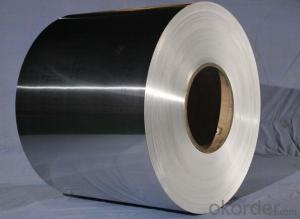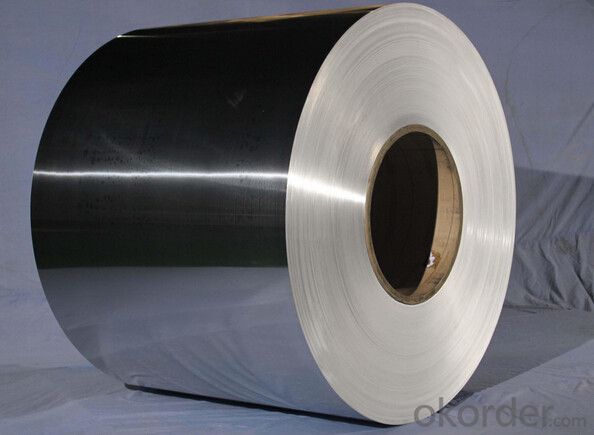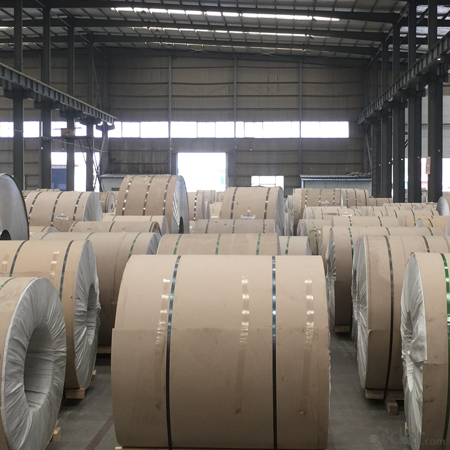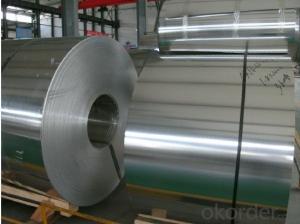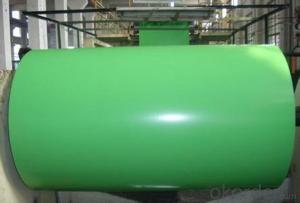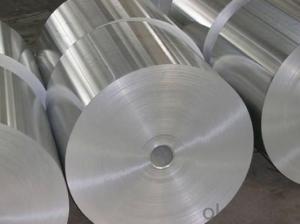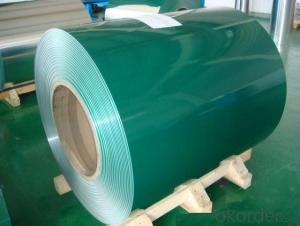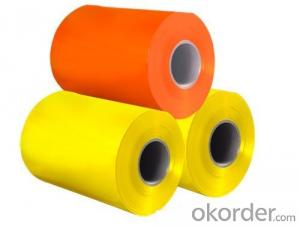Painted Coil Aluminum for Mill Finished Wall Cladding
- Loading Port:
- Shanghai
- Payment Terms:
- TT OR LC
- Min Order Qty:
- 5 m.t.
- Supply Capability:
- 80000 m.t./month
OKorder Service Pledge
OKorder Financial Service
You Might Also Like
Specification
Mill Finished Aluminium Coil For Wall Cladding
Description
Alloy | 1060, 1100, 3003, 8011, etc. |
Temper | H16, H18, H24, H26, H28 |
Thickness | From 0.05mm to 3.0mm |
Width | Standard width:1240mm |
Special width:1300mm, 1520mm, 1570mm, 1595mm | |
Diameter | Standard dia:1200mm |
Interior dia:150mm,405mm,505mm | |
Weight | 2.5 T/coil,3.0 T/coil |
Coating | PE, PVDF, ACRYLIC |
Surface | Embossed, mill finish, coated |
Color | AS to code RAL |
Gloss | 10-90%(EN ISO-2813:1994) |
Coating Thickness | PE: more than 18 micron |
PVDF: more than 25 micron | |
Coating Hardness(pencil resistance) | More than 2h |
Coating adhesion | 5J (EN ISO-2409:1994) |
Impact Resistance | No peeling or cracking(50 kg/cm,ASTMD-2794:1993) |
Flexibility(T-bend) | 2T |
MEK resistance | More than 100 |
Advantage | 1.High temperature resistant 2.Weathering resistant 3.Scrubbing resistant 5.Acid or alkali proof 6. Fireproof 7.Light weight material is easy to construct and install |
Out package | Wooden splint with export standard |
Application | ACP, wall cladding, facades, roofs and canopies, ceilings, signboards, blind window, display platforms, electrical panels, etc |
Manufacturing
Decoiler → Accumulator →Tension Leveler →Acid & Alkali Cleaner → Rinse →Conversion Treatment → Priming coater →Infrared Curing Oven →Main coater →Floatation Curing Oven →Strippable Film Applicator → Exit Accumulator → Recoiler
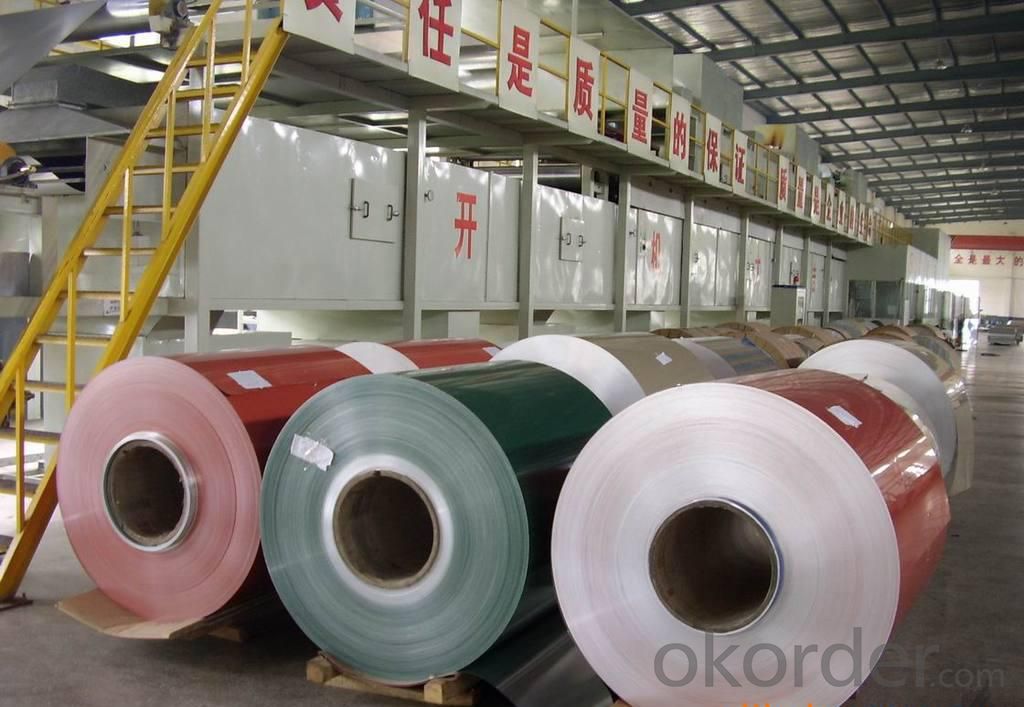
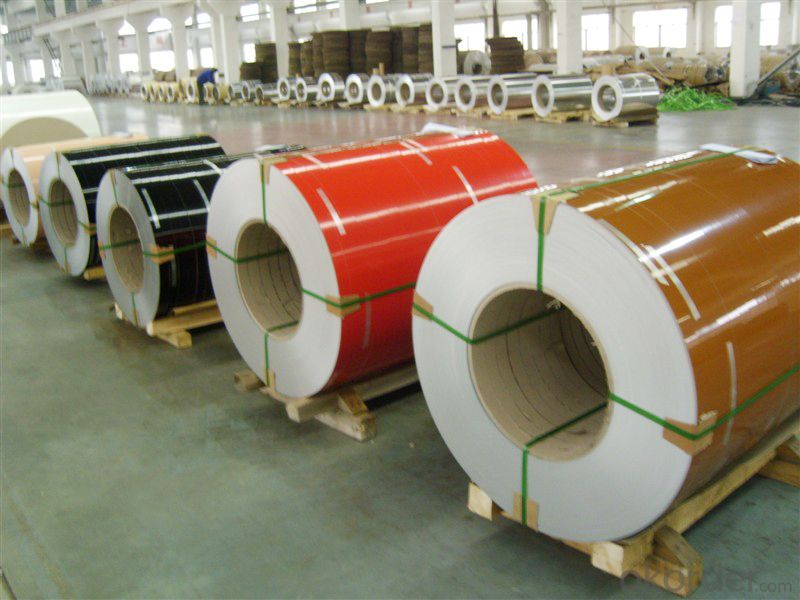
FAQ
--Q: Do you provide free samples?
--A: Yes, free samples will be sent to you on freight at destination.
--Q: Can I get your latest products catalogue?
--A: Yes, it will be sent to you in no time.
--Q: What is the MOQ?
--A: 2 tons
--Q: What are your payment terms?
--A: We accept L/C, T/T.
--Q: What kinds of alloy can you supply?
--A: 1000 series: 1050, 1060, 1070, 1100, 1145, 1200
3000 series: 3003, 3004, 3105, 3104
5000 series: 5052, 5083, 5754, 5182
6000 series: 6061, 6063, 6062, 6063
8000 series: 8011, 8021
--Q: What kinds of temper can you supply?
--A: O-H112: O,H12,H14,H16,H18,H22,H24,H26,H,32,H34,H111,H112
T3, T4, T6
- Q: How do you store aluminum coils to prevent damage?
- To prevent damage to aluminum coils, it is best to store them in a dry and well-ventilated area, away from direct sunlight and moisture. Storing them horizontally on a clean and flat surface, while using proper supports or holders to prevent rolling or bending, will also help maintain their integrity. Additionally, ensuring that the storage area is free from any sharp objects or potentially corrosive materials will further safeguard the aluminum coils from damage.
- Q: What is the role of aluminum coils in the construction of sports stadiums?
- Due to their advantageous properties, aluminum coils play a vital role in the construction of sports stadiums. Primarily, aluminum's lightweight nature makes it an excellent option for large-scale structures like stadiums. By utilizing aluminum coils during stadium construction, transportation and installation become easier, resulting in reduced construction time and costs. Moreover, aluminum possesses high resistance against corrosion, which is particularly advantageous in outdoor environments where stadiums are exposed to harsh weather conditions. This corrosion resistance ensures the longevity and durability of the stadium's structure, thereby minimizing maintenance and repair expenses over time. Furthermore, aluminum coils exhibit exceptional thermal conductivity, allowing for efficient heat transfer and effective temperature regulation within the stadium. This feature becomes especially significant in modern stadiums that require climate control systems to ensure the comfort of both players and spectators. Additionally, aluminum's high malleability enables it to be easily shaped into various forms and sizes, offering flexibility in stadium design and construction. This versatility empowers architects and engineers to create innovative and visually appealing structures, ultimately enhancing the overall aesthetic experience for visitors. In conclusion, aluminum coils play a multifaceted role in the construction of sports stadiums. They provide a lightweight, corrosion-resistant, thermally conductive, and malleable material that facilitates efficient construction, durability, comfort, and aesthetic appeal.
- Q: Can aluminum coils be used in solar panel systems?
- Solar panel systems can indeed utilize aluminum coils. Aluminum is commonly selected as the material for frames and supports in solar panels because of its favorable combination of lightness and strength. Its resistance to corrosion, durability, and impressive thermal conductivity make it an ideal choice for enduring severe weather conditions and efficiently dispersing heat generated by the panels. Furthermore, aluminum is highly recyclable, which aligns perfectly with the environmentally conscious nature of solar energy systems. In conclusion, incorporating aluminum coils into solar panel systems enhances their efficiency, lifespan, and eco-friendliness.
- Q: Can aluminum coils be used for marine applications?
- Yes, aluminum coils can be used for marine applications. Aluminum is a popular material choice for marine applications due to its excellent corrosion resistance in saltwater environments. It has a natural oxide layer that forms on its surface, providing protection against corrosion. Aluminum coils are commonly used for marine applications such as boat hulls, decks, and structures. Additionally, aluminum is lightweight, which contributes to fuel efficiency and improved performance in marine vessels. Its high strength-to-weight ratio makes it an ideal choice for constructing boats and other marine equipment. However, it is important to select the appropriate grade of aluminum alloy that is specifically designed for marine applications to ensure optimal performance and longevity.
- Q: How do aluminum coils contribute to architectural design flexibility?
- Architectural design flexibility is greatly enhanced by the unique properties and versatility of aluminum coils. Firstly, their lightweight nature simplifies handling and installation, in contrast to materials like steel or concrete. This attribute grants architects the freedom to explore more imaginative and innovative designs, unburdened by weight constraints. It also facilitates the construction of large and intricate structures, providing architects with greater design freedom. Secondly, aluminum coils offer an extensive array of surface finishes and colors. They can be painted, anodized, or coated with various materials, enabling architects to achieve desired aesthetic effects and harmonize the building's appearance with its surroundings or intended architectural style. This broad range of finishes allows architects to experiment with diverse visual effects, textures, and patterns, thereby enhancing overall design flexibility. Furthermore, aluminum coils possess exceptional corrosion resistance properties. This durability ensures that architectural elements made from aluminum coils can withstand harsh weather conditions, such as rain, snow, or UV radiation, without deteriorating over time. The extended lifespan and minimal maintenance requirements of aluminum coils make them an appealing choice for architects seeking sustainable and long-lasting design solutions. Moreover, aluminum coils can be easily shaped, bent, or formed into an assortment of profiles and dimensions. This malleability empowers architects to create custom architectural elements that meet specific design requirements, such as curved facades, intricate detailing, or irregular shapes. The ability to mold aluminum coils according to the architect's vision enables the realization of distinctive and unique designs that stand out in the architectural landscape. Lastly, aluminum coils are recyclable and environmentally friendly. By incorporating aluminum into architectural design, architects align themselves with sustainable practices, as aluminum can be recycled repeatedly without losing its properties. This aspect appeals to architects and clients who prioritize eco-friendly design solutions and seek to minimize their carbon footprint. In conclusion, aluminum coils significantly contribute to architectural design flexibility by offering lightweight construction, a wide range of surface finishes, excellent corrosion resistance, malleability, and recyclability. These characteristics empower architects to push the boundaries of design, create visually stunning structures, and deliver sustainable and enduring architectural solutions.
- Q: This question asks for the method to cut an aluminum coil into smaller sections.
- <p>To cut an aluminum coil into smaller pieces, you can use a metal cutting band saw, which is designed for cutting metal materials. Ensure the blade is sharp and the speed is appropriate for aluminum. Secure the coil in a vice or a cutting table to prevent movement during cutting. Wear safety goggles and gloves. Turn on the saw and slowly feed the coil through the blade, applying steady pressure. After cutting, smooth any rough edges with a file or sandpaper. Always follow safety precautions and manufacturer's instructions for your specific cutting tool.</p>
- Q: How exactly can you tell (just by looking) that the nipple used to tighten a spoke is brass and not aluminum? I know some are silver - not sure if they are painted silver or what. But without scraping or causing any damage to the nipple, how would one know for sure if they have no experience between the two.p.s. I don't know how heavy or light either is, so if that is one way to tel, it's not a good way for me.
- Commercially pure aluminum has a tensile strength of approximately 90MPa and can be improved to around 180MPa by cold working. Typical Brass alloys have tensile strengths in the range 250 - 500MPa. There maybe different brass materials which exceed this limit. There may be those which are lower in tensile strength than the minimum of this range. Check in the web. But, according to these data, you can see that Brass is stronger than Aluminum. So, the brass plate is stronger than the Al plate. However, Aluminum is a pure metal. Brass is an alloy. So, there maybe different brasses depending on their composition.
- Q: Is it possible to utilize aluminum coils in the manufacturing of furniture?
- <p>Yes, aluminum coils can be used to make furniture. Aluminum is known for its strength, durability, and resistance to corrosion, making it an ideal material for furniture construction. It is commonly used in outdoor furniture due to its weather resistance. Aluminum coils can be formed into various shapes and sizes to create frames, legs, and other structural components of furniture. Additionally, aluminum's lightweight nature makes it easy to handle and transport, which is beneficial for both manufacturers and consumers.</p>
- Q: Can aluminum coils be anodized for enhanced durability?
- Yes, aluminum coils can be anodized to enhance their durability. The anodizing process creates an oxide layer on the surface of the aluminum, making it more resistant to corrosion, wear, and abrasion. This improves the overall lifespan and performance of the coils.
- Q: Are aluminum coils suitable for beverage can manufacturing?
- Aluminum coils are indeed appropriate for the production of beverage cans. Aluminum is the favored material for this purpose because of its numerous beneficial characteristics. To begin with, aluminum is lightweight, enabling easy transportation and handling. This is especially crucial in the beverage industry, where a substantial number of cans are manufactured and distributed. Furthermore, aluminum possesses high malleability, allowing it to be shaped into the desired form without compromising its structural integrity. This quality makes it perfect for the manufacturing of cans, as it can be effortlessly molded into the cylindrical shape required and withstand the pressure exerted by carbonated beverages. Moreover, aluminum is non-toxic, ensuring that it does not contaminate the beverages stored within the cans. It also acts as a protective barrier against light, oxygen, and moisture, effectively preserving the flavor and quality of the beverages. Additionally, aluminum is recyclable, thus making it an environmentally friendly option for can production. The recycling process for aluminum consumes significantly less energy than the production of new aluminum, rendering it a sustainable material choice. In summary, the appropriateness of aluminum coils for beverage can manufacturing is evident due to their lightweight nature, malleability, non-toxicity, preservation properties, and recyclability.
Send your message to us
Painted Coil Aluminum for Mill Finished Wall Cladding
- Loading Port:
- Shanghai
- Payment Terms:
- TT OR LC
- Min Order Qty:
- 5 m.t.
- Supply Capability:
- 80000 m.t./month
OKorder Service Pledge
OKorder Financial Service
Similar products
Hot products
Hot Searches
Related keywords
